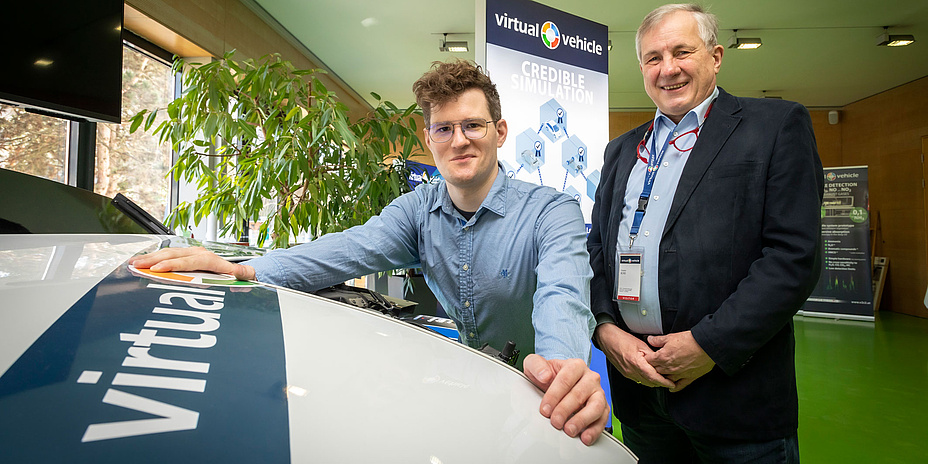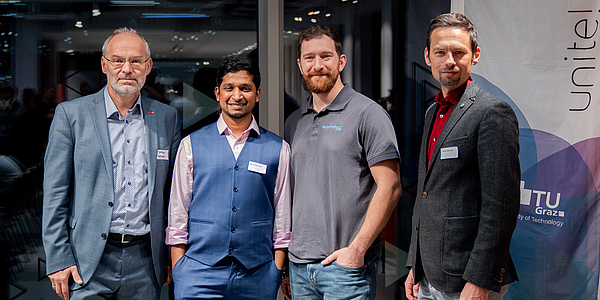Niels Köster: Fun with Research

Niels Köster and research. It was not love at first sight, affirms the 31-year-old electrical engineer: “My very first paper was mercilessly rejected. I got three rejections in a row! I thought briefly of giving up my scientific career before it had even begun.” The Master’s programme in Mathematics at Graz University of Technology (TU Graz) is ultimately “a good springboard for a top career in industry”, says Köster. Instead, however, his journey led him to Virtual Vehicle Research, Europe’s largest research centre for virtual vehicle development. There he is part of the battery working group that uses numerical simulations and hardware tests to test new power electronics for electric cars among other things. At the same time, he is writing his dissertation. His supervisor is TU Graz Professor Oszkar Biro at the Institute of Fundamentals and Theory in Electrical Engineering. This is not an unusual situation, especially since TU Graz is the majority owner of Virtual Vehicle and the two institutions work together on many research projects.
Game changer in e-mobility...
Köster is specifically working on transforming complex slower modelling methods such as the finite element method (FEM) into small but faster models without these models losing much accuracy. For this purpose, he uses the so-called model order reduction (MOR). This technique tries to capture the essential features of a model as early as possible. This means that the basic properties can already be recognized with very few variables. Subsequently, the complexity can be increased step by step in order to represent all properties of the model that are necessary for the use case.
“Time is money. My modelling is meant to help the industry to develop power components for e-mobility more quickly,” says Köster. So in layman’s terms, one could say that Köster’s work is a game changer in electromobility.
...and in scientific publishing
For Köster, the game changer for scientific publishing was ultimately the course “Effective scientific writing in English”. This is offered in the TU Graz internal continuing education programme. In the course, Köster learned methods that made scientific writing for specialist journals much easier for him. “Writing a Paper” by George Whitesides for example: “At the beginning of every research project I write a draft, which works like a project plan for publication. Throughout the research process, this draft is regularly revised if there are changes or new results,” says Köster, explaining his tactics.
Science prize as acknowledgement
This tactic works perfectly. At this year’s Compumag (note: one of the most important international conferences for the numerical calculation of electromagnetic fields), Köster received the Rita Trowbridge Award. The award is given only every two years to an emerging talent with the best conference paper. What is particularly remarkable is that the electrical engineer beat more than 150 other participants. A great success – also for the Institute of Fundamentals and Theory in Electrical Engineering, to which Köster dedicated the prize: “I am employed full-time at Virtual Vehicle, but at the same time I feel like an equal member of the institute.” Köster is fully integrated in the technical discussions and the day-to-day running of the institute, has weekly meetings with his supervisor Professor Biro, and “I can use simulation software developed at the institute for my work.”
Brake-block Covid
This team structure also helped him over the last two years, during which the Covid pandemic made research very difficult. Practically overnight, the personal exchange with other young researchers disappeared, also because almost all scientific conferences and meetings shifted to the internet. But: “Virtual interactions don’t work so well – partly because of the different time zones, partly because of the technical circumstances. During this time, I shifted my focus to researching and reading technical literature,” says Köster, who eagerly awaited the opening steps and also used the Compumag conference to set up an international working group focusing on model order reduction for electromagnetic fields. The cooperation is to run under the international Compumag Society.
A first meeting has already taken place, attended by colleagues from RWTH Aachen University, the University of Southampton, the Canadian McGill University and from the University of Pavia. “I need the social contact. The exchange with other researchers takes me further.”
And the winner is…Graz
But where to? The Hamburg native doesn’t know that yet. He can well imagine staying in Graz even after completing his doctoral thesis. And this despite the fact that he himself only decided to study at TU Graz at a late stage, as he explains: “After my matriculation, I had four universities on my short list that had a good reputation in technical and applied mathematics.” In the end, he opted for Graz and against Stuttgart, Bremen and Zurich. Also because of love, as he confesses. He quickly grew fond of the city with its leisure facilities and proximity to nature. He is currently looking for post-doctoral positions. After all, they say, love happens, but relationship is work – which apparently also pays off professionally.
Kontakt
Niels Sören KÖSTER
Dipl.-Ing.
Virtual Vehicle Research GmbH | attery Working Group, Department E
Phone: +43 316 873 4034
niels.koester@v2c2.at




